In This Edition:
- From the Director
- Focus on RG Scholarships
- Remote X-ray Operators Course
- Year One Medical Students Rural Week
- Tasmanian Rural Health Conference – “Coming Together”
- Flood Support
- Budget for Rural Health
- Senate Inquiry into Rural Health
- Karen Price Visits Tasmania
- Influence of Rural Clinical School Experience and Rural Origin on Practicing in Rural Communities Five and Eight Years After Graduation
- Emergency Department First Advanced Diploma Graduate
From the Director
I hope you all had a restful Easter break in preparation for our massive, combined flu and covid vaccination clinics.
Lots has been happening in the Rural space with commitments federally for rural practice and a senate enquiry into R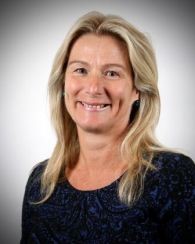 ural health Services.
ural health Services.
The last few months have been busy supporting the recruitment drive for GP and RG training schemes. Next year there is a commitment for more rural federally funded places for both colleges. The application process is now closed, and we are moving onto rural intern and RMO recruitment. This month we open our RG scholarships to coincide with intern applications.
There is a commitment to continue to fund and expand the GP placements for junior doctors with a new revamped prevocational scheme named after John Flynn. Tasmania leads the country with Junior doctor placements in rural practice. These posts are important for recruiting our next generation of rural doctors.
We welcome the new Appointment of Nat Burch as Tasmanian Director of Training for ACRRM. Nat is an amazing rural educator, who has worked for GPTT and RVTS for many years. We featured Nat in the December newsletter talking about her innovative approach to training at Scottsdale.
We are sad to lose Jodie Hanlon our media and communications officer. Jodie is moving to Western Australia to take up a community engagement post with her husband. We wish her all the best with her new adventures and thank her for all her work.
Professor Lizzi Shires – Director, Tas Rural Pathways
Focus on RG Scholarships
The Rural Generalist Pathway Scholarship (RGPS) is now taking applications for 5th year UTAS medical students looking to start their career as a rural generalist or rural general practitioner.
The scholarship offers medical students up to $15,000 over a three-year period and provides an opportunity to attend accredited and non-accredited:
- workshops
- conferences
- short courses
Eligible applicants who have accepted their intern offer at the Launceston General Hospital or North West Regional Hospital will receive a $3,000 cash payment to support their transition into the hospital system. They will also receive free attendance and accommodation to the Tasmanian Rural Health Conference 2022 in Launceston. During their internship year (PGY1) and RMO year (PGY2) they will have $5,000 available per year to support their attendance to conferences and clinical training workshops.
hospital system. They will also receive free attendance and accommodation to the Tasmanian Rural Health Conference 2022 in Launceston. During their internship year (PGY1) and RMO year (PGY2) they will have $5,000 available per year to support their attendance to conferences and clinical training workshops.
Claire Griffiths was awarded one of these scholarships in 2021. Claire has been able to kick start her career with her intern rotations at the Northwest Regional Hospital in Medicine, Surgery and ED and a placement in rural practice.
Claire graduated from the Rural Clinical School in 2021 and enjoys working in the North West. She is an active member of the Burnie Emus Rugby Union Club and is part of the medical mum’s group with her two children Scarlet and Elijah.
For more information and to apply for a scholarship, visit the HR+ website
 Remote X-ray Operators Course
Remote X-ray Operators Course
The new Remote X-ray Operators Course is now LIVE!
This new online course has been designed and written by both rural generalist doctors and experienced radiographers to improve the quality of training for those professionals wishing to gain their X-ray licence. This online course focuses on the theoretical knowledge and provides a basic overview of how to convert that knowledge into practice. There are six modules, and it is anticipated it would take about 18 hours to complete. The course is a FREE self-paced course that can be re-visited at any time to refresh. It is also open to all health professions.
Please note completion of the course does not enable you to obtain a X-ray licence on its own, however provides background to the practical component. Further details on how to arrange the practical component are included in the online module. If you are a rural generalist or rural generalist trainee that requires support to access the practical component, please contact the Tasmanian Rural Generalist Pathway Coordination Unit (TRGP CU) at tasrural.pathways@health.tas.gov.au
A big thank you to the collaborating organisations and staff who contributed to the creation of this module including the University of Tasmania, the Australian Antarctic Division, the Tasmanian Health Service, the Radiation Protection Unit and the TRGP CU steering group – the Centre for Antarctic Remote and Maritime Medicine. The course is currently an ACRRM PDP Accredited Activity 2020-2022.
This course was made possible through funding from the Australian Government under the National Rural Generalist Pathway Initiative.
Year One Medical Students Rural Week
Introducing medical students to rural practice is a core part of the Tasmanian Medical School curriculum. This year students had the opportunity to visit health services in Bruny and Huonville. Students learnt about rural health and the importance of the extended rural health team. Farm visits were included in the day so that students could experience the field to platter approach to sustainable farming. Students also learnt the OH&S aspects of farming and how to improve health in rural areas.
Many thanks to the Huonville and Bruny practices and their teams for inspiring the next generation of rural doctors.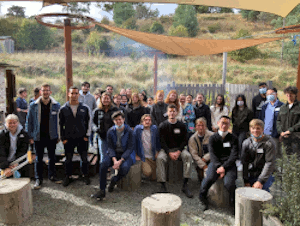
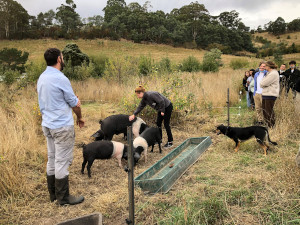
Tasmanian Rural Health Conference – “Coming Together”
The Tasmanian Rural Health Conference is scheduled to take place on Saturday the 17th and Sunday the 18th of September at Tamar Valley Resort in Launceston.
Our annual health conference will welcome keynote speakers including Associate Professor Ruth Stewart (Rural Health Commissioner), Sarah Chalmers (ACRRM President) and Michael Clements (Chair of Rural RACGP).
We have a variety of workshops including women’s health, emergency skills, chronic pain and mental health, as well as practical suturing and airway stations.
We will be partnering with HR+ this year to deliver a family and partner’s programme. We anticipate bookings to open in May.
We look forward to coming together with all our rural colleagues.
Flood Support
Our thoughts have been with our colleagues in flood affected areas and I know many of us have been looking at ways to practically support practices interstate.
Rural Clinical School medical student Josh Ragg was called up as one of nine SLST Swift Water Rescue Technicians from across the state. Josh travelled to New South Wales for their flood response efforts across the north and mid north coast of New South Wales.
To read about their rescue efforts, visit the Surf Life Saving New South Wales website
Budget for Rural Health
The Budget 2022-23: Building upon the Stronger Rural Health Strategy committed more funding for rural training places, outreach services including mental health and improved diagnostic imaging.
For more information and to download a copy of the Budget, visit the Australian Government Department of Health website
Senate Inquiry into Rural Health Services
The “Provision of general practitioner and related primary health services to outer metropolitan, rural and regional Australians” senate inquiry is out. There are no real surprises but it reiterates the recommendations about workforce distribution, support, training and remuneration.
To view the senate inquiry, consult the Provision of general practitioner and related primary health services to outer metropolitan, rural and regional Australians Interim Report
Karen Price Visits Tasmania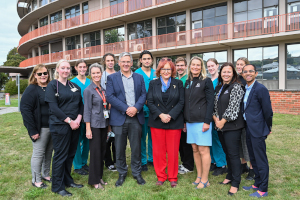
Karen Price, President of RACGP, visited Tasmania earlier this month. She spent a day in the North West talking to rural students and doctors in training. She also visited rural practices and spent time listening to the issues affecting these practices and their training.
Karen visited the Mersey Community Hospital where the Rural Medical Workforce Centre is being developed to promote rural training for Rural Generalists. In addition, she visited the Rural Clinical School to talk to students about what had inspired them to go rural and what their future plans were.
The visit took in Jim Berryman’s practice in Wynyard. Jim’s practice has a strong training ethos and continues to attract and retain GPs. Jim won supervisor of the year in 2020.
Patrick Street Clinic hosted a breakfast meeting with Karen and Victoria Street Clinic. One of the hot topics discussed was increasing financial viability or rural practices through mixed billing.
To read more about the $1 million investment in the Mersey Community Hospital Rural Medical Workforce Centre, visit The Advocate website
Influence of Rural Clinical School Experience and Rural Origin on Practicing in Rural Communities Five and Eight Years After Graduation
Newly published research in the Medical Journal of Australia confirms the key factors that influence practicing in rural communities. Doctors who come from rural backgrounds and have extended periods of time training rurally are more likely to be practicing rurally eight years after graduation. UTAS Rural Clinical School contributed data to this important study. The pooled data confirms what our local data has shown for several years.
The Rural Clinical School has been working with admissions and local schools to promote medicine as a career for rural students. The goal is to have at least 25% of our medical students coming from Tasmanias rural areas. In the last few years the Rural Clinical School has been running a pilot allowing rural students to study closer to home with Years 1-3 being run on the North West coast as well as the senior years. Of our initial pilot, 3 of the 4 students that did third year with us have stayed on as interns and anticipate to continuing to practice rurally.
To read the paper, visit the Medical Journal of Australia Online Library
Emergency Department First Advanced Diploma Graduate
The Royal Hobart Hospital Emergency Department is pleased to congratulate Dr Emilie Willcox on her recent graduation with an Australian College of Emergency Medicine Advanced Diploma in February 2022. Dr Willcox is the first person t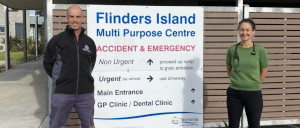 o graduate from the RHH ED with the Australian College of Emergency Medicine qualification which is designed to enable medical staff to stabilize and manage critically ill and injured patients, not only in Emergency Departments, but also in remote settings.
o graduate from the RHH ED with the Australian College of Emergency Medicine qualification which is designed to enable medical staff to stabilize and manage critically ill and injured patients, not only in Emergency Departments, but also in remote settings.
Dr Willcox commenced her Emergency Medicine Advanced Diploma in 2017 and over the following 4 years she gained competencies in a wide variety of emergency procedures including (but not limited to) emergency intubations and airway procedures, neonate resuscitation, lumbar punctures, fracture reductions and cardioversions.
The Emergency Medicine Certificate and Diploma programs are run by the Australian College of Emergency Medicine (ACEM) and supported locally by the Federally funded Department of Health Emergency Medicine Education and Training (EMET) program. Dr Juan Ascencio-Lane is the Clinical Lead for EMET in Hobart and is proud of not only what Dr Willcox has achieved but also the success of the Certificate and Diploma Programs in the RHH ED. There are currently 6 Doctors studying for the Diploma and 2 studying for the Certificate, with 16 Certificate graduates in the last 5 years.
Whilst the Diploma is aimed to equip medical staff with the skills and knowledge to independently manage highly complex emergency presentations, the Certificate is often desirable for Medical Practitioners who wish to have knowledge and skills in treating common emergency presentations such as plastering fractures, wound suturing, eye foreign bodies and basic airway management. The RHH ED EMET team supports and encourages any medical staff who wish to further their skills and education in Emergency – with not only Certificate and Diploma courses but also the Advanced Diploma.
Dr Willcox is now using her emergency skills in the remote setting of Flinders Island. To have such a skilled and qualified Emergency GP on Flinders Island is an enormous benefit for the people living on Flinders Island and surrounding (even more remote!) islands. EMET hope to continue supporting Dr Willcox through ongoing EMET education, which is provided to rural and remote GPs throughout Tasmania.
For further information regarding EMET and its Emergency training program please contact Dr Juan Ascencio-Lane at juan.ascencio-lane@ths.tas.gov.au
This story was written and published by Kylie Shelverton (Clinical Nurse Educator – Emergency Medicine Education & Training)
The Tasmanian Rural Generalist Pathway is supported by funding from the Australian Government under the National Rural Generalist Pathway Initiative.

